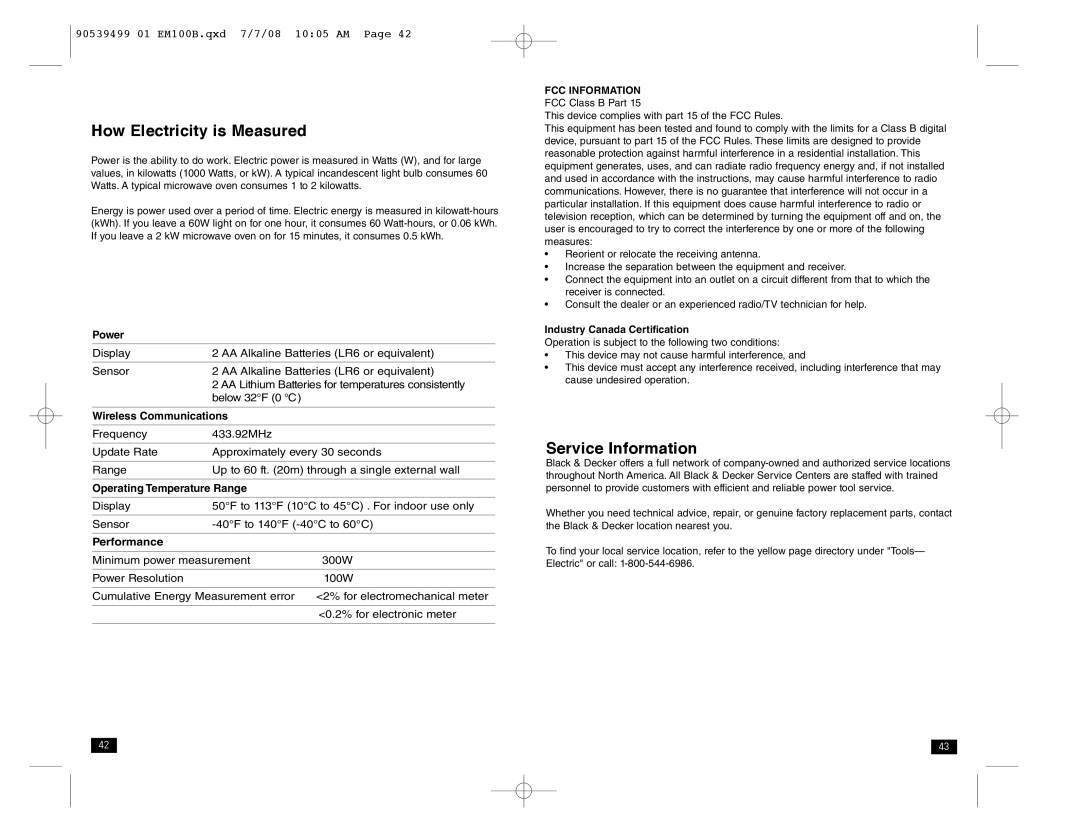
90539499 01 EM100B.qxd 7/7/08 10:05 AM Page 42
12 HOWELECTRICITY IS MEASURED
How Electricity is Measured
Power is the ability to do work. Electric power is measured in Watts (W), and for large values, in kilowatts (1000 Watts, or kW). A typical incandescent light bulb consumes 60 Watts. A typical microwave oven consumes 1 to 2 kilowatts.
Energy is power used over a period of time. Electric energy is measured in
13 TECHNICALSPECIFICATIONS
Power
Display | 2 AA Alkaline Batteries (LR6 or equivalent) | |
Sensor | 2 AA Alkaline Batteries (LR6 or equivalent) | |
| 2 AA Lithium Batteries for temperatures consistently | |
| below 32°F (0 °C) |
|
|
| |
Wireless Communications |
| |
|
|
|
Frequency | 433.92MHz |
|
|
| |
Update Rate | Approximately every 30 seconds | |
|
| |
Range | Up to 60 ft. (20m) through a single external wall | |
|
| |
Operating Temperature Range |
| |
|
| |
Display | 50°F to 113°F (10°C to 45°C) . For indoor use only | |
Sensor | ||
|
|
|
Performance |
|
|
|
| |
Minimum power measurement | 300W | |
Power Resolution |
| 100W |
|
| |
Cumulative Energy Measurement error | <2% for electromechanical meter | |
|
|
|
|
| <0.2% for electronic meter |
FCC INFORMATION
FCC Class B Part 15
This device complies with part 15 of the FCC Rules.
This equipment has been tested and found to comply with the limits for a Class B digital device, pursuant to part 15 of the FCC Rules. These limits are designed to provide reasonable protection against harmful interference in a residential installation. This equipment generates, uses, and can radiate radio frequency energy and, if not installed and used in accordance with the instructions, may cause harmful interference to radio communications. However, there is no guarantee that interference will not occur in a particular installation. If this equipment does cause harmful interference to radio or television reception, which can be determined by turning the equipment off and on, the user is encouraged to try to correct the interference by one or more of the following measures:
•Reorient or relocate the receiving antenna.
•Increase the separation between the equipment and receiver.
•Connect the equipment into an outlet on a circuit different from that to which the receiver is connected.
•Consult the dealer or an experienced radio/TV technician for help.
Industry Canada Certification
Operation is subject to the following two conditions:
•This device may not cause harmful interference, and
•This device must accept any interference received, including interference that may cause undesired operation.
13 TECHNICALSPECIFICATIONS
Service Information
Black & Decker offers a full network of
Whether you need technical advice, repair, or genuine factory replacement parts, contact the Black & Decker location nearest you.
To find your local service location, refer to the yellow page directory under "Tools— Electric" or call:
42 |
|
|
|
| 43 |
|
|
|
|
|
|
|
|
|
|
|
|
|
|
|
|
|
|
